Protecting Mediterranean Sea Life
Air Date: Week of September 15, 2023
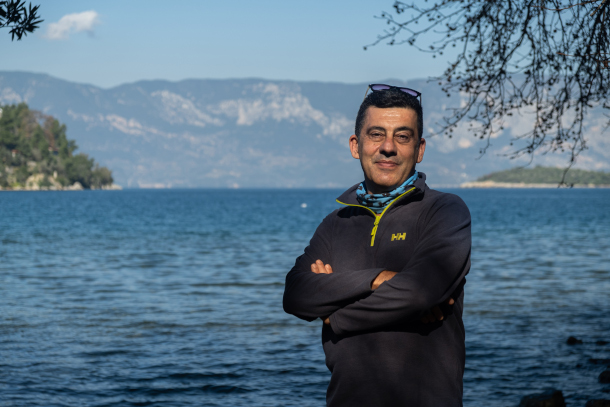
Zafer Kizilkaya, the winner of the 2023 Goldman Environmental Prize for Asia, is fighting to protect Turkey’s coastal ecosystems. (Photo: Goldman Environmental Prize, used with permission)
Overfishing, warming oceans, invasive species, and unsustainable tourism threaten the rich marine life in the Mediterranean. So Turkish civil engineer and diver Zafer Kizilkaya got together with local fishermen to pilot a community-run Marine Protected Area that led to expanded marine conservation in Turkey. Mr. Kizilkaya was awarded the 2023 Goldman Environmental Prize for Asia for his work, and he joined Living on Earth’s Bobby Bascomb.
Transcript
CURWOOD: The Mediterranean Sea covers less than one percent of the world’s ocean surface yet is home to as much as 18% of all known marine wildlife. And endangered species from the Mediterranean monk seal to the sandbar shark, breed and feed in Turkey’s Gokova Bay. But a combination of overfishing, warming oceans, invasive species, and unsustainable tourism has threatened these populations for years. So, a civil engineer and diver named Zafer Kizilkaya got together with local fishermen in Gokova Bay to pilot a community-run Marine Protected Area. The Turkish government saw the success of the project and expanded the country’s marine protected areas to include 310 miles of coastline. Mr. Kizilkaya was awarded the 2023 Goldman Environmental Prize for Asia for his work, and he spoke with Living on Earth’s Bobby Bascomb.
BASCOMB: First of all, congratulations on winning the Goldman Prize!
KIZILKAYA: Thank you very much. Yes, this is a big surprise for me.
BASCOMB: So tell us more about the threats to Turkey's Gökova Bay. What are your concerns that led you to take on this project?
KIZILKAYA: So the illegal fishing and overfishing at the beginning was the biggest damage. And then comes the climate change impact. Because of the enlargement in the Suez Canal, there are more invasive species easily passed through, and more than 60, 65% of the catch during the summertime are just invasive species. And then when you go underwater, you totally lost your micro algae cover, which harbors so many small fish, crustaceans and other organisms. So it's like waking up one morning, there are no trees left in the country. But if this happens underwater, nobody notices that and thinks that this is normal. So we are just shifting our baselines. What we have seen today as a normal--it is not.
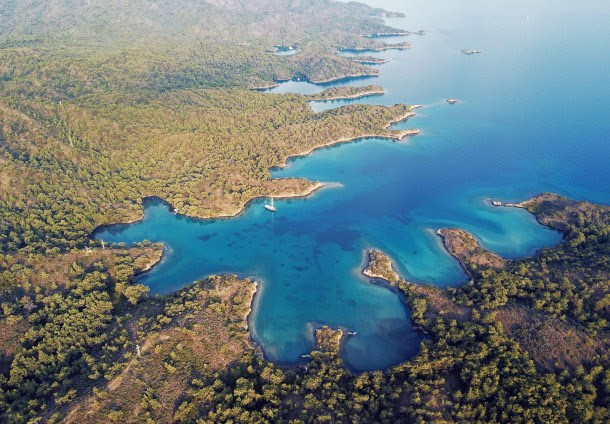
In 2012, Mr. Kizilkaya led the effort to establish Turkey’s first community-managed Marine Protected Area, which aimed to restore the vibrant ecosystems of Gökova Bay. (Photo: Zafer Kizilkaya, used with permission)
BASCOMB: And you've been working on this problem for quite a while now. Back in 2012, I understand, you created Turkey's first community managed Marine Protected Area. Can you tell us about that, please? You know, how does a community manage a Marine Protected Area? How does that work?
KIZILKAYA: We established our own ranger system with support of the Coast Guard. We just asked fishing community members, because fisheries were already collapsed in some extent, anybody who would like to become a ranger, you're always welcome. So a couple of volunteers came, they quit fishing, they sold their boats. So we trained them, we equipped them with the high tech systems. We are just reporting the deliberate illegal fishing activities. And the Coast Guard came later and find those people. So the system at the beginning kind of had a difficulty because people didn't like the idea being under control by rangers, and especially the people they know of. Other fishers saw the increase in fish catch. And they noticed that okay, this protected area's working very well for sustainable fishing. So they are our number one supporters. They're just reporting us any kind of illegal activities.
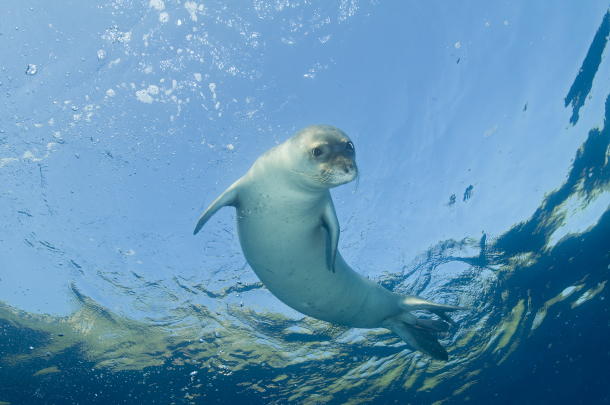
Gökova Bay and the rest of the Turquoise Coast provide habitat for endangered species like the Mediterranean monk seal. (Photo: Zafer Kizilkaya, used with permission)
BASCOMB: So from what I understand that first Marine Protected Area that you worked on worked out very well. And fishermen saw an increase in their catch, and the community is happy with it, it's improved the ecosystem. How did that experience inform your decision to move forward with this much larger Marine Protected Area that you took on in 2020, and for which you've won the Goldman Prize?
KIZILKAYA: Yeah well you know, among fishers, the gossips are the very efficient way of communication.
BASCOMB: I think it's not just fishers.
KIZILKAYA: Okay. So they heard that the people were catching a lot of fish in Gökova. And then we heard that they would like to talk with us, they would like to have the same model. Of course, these are not that easy, because there's so many stakeholders, including industrial fishers, which are always against the all kinds of conservation efforts, because you know, they have been doing free for all, there are no boundaries for them. They have a very strong lobby, on the government side. So it's not easy to establish those areas. But the Gökova at that point was a leverage for us. So governments saw that, okay, that's a kind of a good model, because they're looking from the perspective that the biodiversity will increase, we are saving flagship species. And at the same time, the community is also having continuous fish supply.
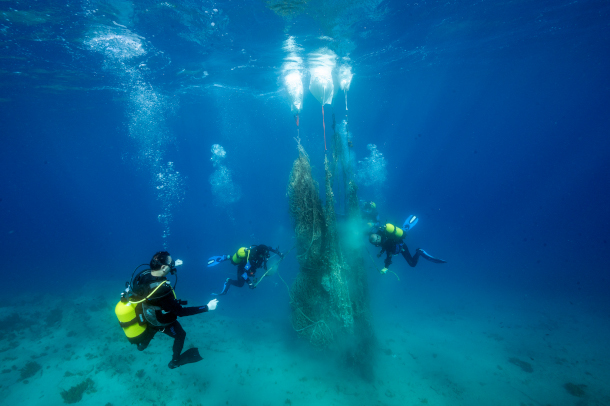
The scourges of overfishing, invasive species, and climate change threaten the Turquoise Coast’s ecosystems. Here, divers clean up a mass of abandoned fishing nets. (Photo: Zafer Kizilkaya, used with permission)
BASCOMB: And in your opinion, why are Marine Protected Areas the best way to address, you know, these many challenges facing marine ecosystems?
KIZILKAYA: So fully protected areas, when there is appropriate enforcement, we noticed that, you know, within three to five years, more than tenfold increase in the fish biomass. And at the beginning, we have only one or two Mediterranean monk seals in the whole bay. Right now, we just identified 11 monk seals, because there are a lot of fish in the protected areas. So they know that there's a food source there. And also the sharks, their breeding area are under protection. And every day we have patrolling there. So you can easily notice that the sea is just, the nature is coming back so fast. So it's not that difficult. You know, we're talking about 1% of the ocean's surface under protection right now. You know, if we can increase this to 20 in the real sense, we could save the entire future of oceans, you know, marine biodiversity and the fisheries at the same time.
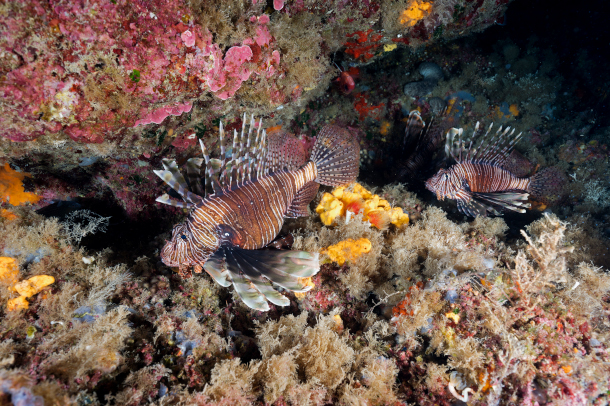
Mr. Kizilkaya says invasive species make up a big portion of local fishers’ catch. He’s worked with chefs to find ways of including species like lionfish on restaurant menus. (Photo: Zafer Kizilkaya, used with permission)
BASCOMB: And so the idea, the basic idea behind a Marine Protected Area is this is a spot that's set aside where there's no fishing or very limited fishing. And I would imagine then you have this spillover effect, you know? If fish are allowed to grow to their full capacity and reproduce to their full capacity, I mean, it only improves of course, that area, but areas around it as well in terms of you know, catch available to people and the health of the ecosystem more broadly.
KIZILKAYA: This is exactly what we have experienced in our case, because in the last 10 years, the income of small scale fishing in Gökova Bay is just increasing steadily. It's still going up. So that means it is working, and it keeps working. And when you look at the sizes of the fish, there is a huge difference, certain sea breams, which were 10 years ago, only 15 centimeters. Now they're 40, 50 centimeters. So this is such a great model in our hand, why we cannot replicate this?
BASCOMB: What's next for you? What conservation projects do you see in your future? And how might winning the Goldman Prize inform those choices and allow you to do your work going forward?
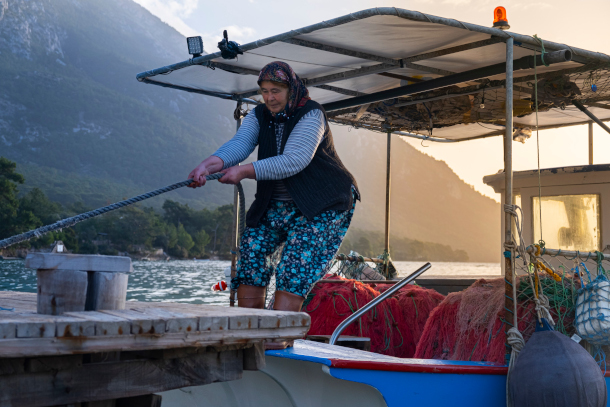
Mr. Kizilkaya partnered with local fishers to create Marine Protected Areas managed by the communities that depend on them. (Photo: Omer Ozyilmazel, used with permission)
KIZILKAYA: The biggest challenge right now we are facing--the climate change impact, because the water temperatures have been rising. And in the last 10 years, we have at least 10 invasive tropical species coming from the Red Sea, you know, changing the entire fishing industry. So we tried to start a project buying invasive species from the small scale fishers and just selling to the seafood industry and restaurants. And there was a big demand started. So it's a kind of campaign that we have been working on right now. And the next part, that expanding the protected areas more and more, because not in the all protected areas right now we have enforcement. There's a huge capacity to do that. Turkish coastline is almost 9,000 kilometers, one of the biggest in the Mediterranean. And I believe that you know, the leverage of Goldman Environmental Prize will help this achieving on that.
BASCOMB: Well, I wish you the very best of luck in all of your future work and thank you for the work that you've done so far.
KIZILKAYA: Thank you so much.
BASCOMB: Zafer Kizilkaya is this year's Goldman Prize winner for Asia. Thank you so much for taking this time with us today.
KIZILKAYA: Thank you.
CURWOOD: Zafer Kizilkaya spoke with Living on Earth’s Bobby Bascomb.
Links
The Goldman Environmental Prize | “2023 Goldman Prize Winner Zafer Kizilkaya”
Learn more about the Akdeniz Koruma Derneği (Mediterranean Conservation Society)
CNN | “Environmental Hero’s Mission to Save The Most Over-Fished Sea in The World.”
Living on Earth wants to hear from you!
Living on Earth
62 Calef Highway, Suite 212
Lee, NH 03861
Telephone: 617-287-4121
E-mail: comments@loe.org
Newsletter [Click here]
Donate to Living on Earth!
Living on Earth is an independent media program and relies entirely on contributions from listeners and institutions supporting public service. Please donate now to preserve an independent environmental voice.
NewsletterLiving on Earth offers a weekly delivery of the show's rundown to your mailbox. Sign up for our newsletter today!
 Sailors For The Sea: Be the change you want to sea.
Sailors For The Sea: Be the change you want to sea.
 The Grantham Foundation for the Protection of the Environment: Committed to protecting and improving the health of the global environment.
The Grantham Foundation for the Protection of the Environment: Committed to protecting and improving the health of the global environment.
 Contribute to Living on Earth and receive, as our gift to you, an archival print of one of Mark Seth Lender's extraordinary wildlife photographs. Follow the link to see Mark's current collection of photographs.
Contribute to Living on Earth and receive, as our gift to you, an archival print of one of Mark Seth Lender's extraordinary wildlife photographs. Follow the link to see Mark's current collection of photographs.
 Buy a signed copy of Mark Seth Lender's book Smeagull the Seagull & support Living on Earth
Buy a signed copy of Mark Seth Lender's book Smeagull the Seagull & support Living on Earth

